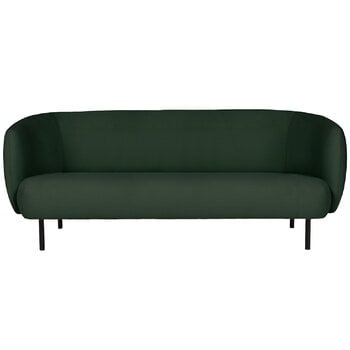Cape sofa by Warm Nordic has an airy appearance formed by a curved, upholstered body and slim metal legs. Designer Charlotte Høncke found inspiration for the sofa’s streamlined silhouette and stitched fabric from the world of fashion. Thanks to its timeless character, Cape will suit both modern and more classic interiors, and its light structure makes it a great fit also in a central spot of the room. The sofa has been upholstered in high-quality wool fabric by Kvadrat.
Cape sofa, 3-seater, forest green
Warm Nordic
Description
Cape sofa by Warm Nordic has an airy appearance formed by a curved, upholstered body and slim metal legs. Designer Charlotte Høncke found inspiration for the sofa’s streamlined silhouette and stitched fabric from the world of fashion. Thanks to its timeless character, Cape will suit both modern and more classic interiors, and its light structure makes it a great fit also in a central spot of the room. The sofa has been upholstered in high-quality wool fabric by Kvadrat.
Product details (12)
- Colour
- Forest green
- Width
- 200 cm
- Depth
- 82 cm
- Height
- 82 cm
- Suspension system
- Spring system
- Seat cushion
- Foam, feather system
- Backrest cushion
- Foam, feather system
- Upholstery fabric
- Kvadrat: Steelcut 975, 90% wool, 10% nylon
- Abrasion resistance
- 80,000 Martindale
- Lightfastness
- 4-5
- Base material
- Black laquered steel
- Pilling
- 3-4
- Product ID
Designer
Danish designer Charlotte Høncke plays with functionality and aesthetics in surprising ways. Høncke graduated as Industrial Designer from the Danish School of Architecture in 2002, and founded her own studio in Aarhus in 2010.
View all productsReviews (0)
Sustainability
The Product Sustainability Framework, our criteria of sustainable design, helps you find the most sustainable products in our selection. Read below which sustainability criteria this product has met.
Working conditions & labour 9/9
-
Equal opportunities for all employees
-
Commitment to UN Global Compact, fair compensation for all employees
-
Corporate responsibility requirements defined and communicated for suppliers
-
Systematic work for improved inclusion and well-being in the workplace
-
Transparent supply chain
-
Suppliers' compliance to a code of conduct ensured
-
Direct suppliers audited and certified
-
Compliance to the UN Guiding Principles on Business and Human Rights ensured in the supply chain
-
Support for community involvement in the supply chain
Eco-friendly production 7/9
-
Fair and resource-wise water-use in production
-
No incineration or landfilling of returned items
-
No use of endangered species as materials
-
No direct environmental emissions or waste (excl. GHGs) from production
-
Material-efficient and ecological packaging
-
Positive impact on nature’s well-being through operations that regenerate natural ecosystems
-
No potentially harmful chemicals used in own production
-
The sustainability of direct suppliers' production is addressed and monitored
-
Production and material sourcing that respect biodiversity, animal rights, and natural ecosystems
Climate impact 4/8
-
Company's direct greenhouse gas emissions identified and commitment to reduction
-
Product's carbon impact identified and commitment to reduction
-
Guidance on energy- and eco-efficient use of the product
-
Contribution to climate initiatives beyond the brand’s direct operations
-
Low-carbon or compensated transportation
-
Carbon footprint of the product calculated and goals set to reduce it
-
100 % renewable energy in own production and operations
-
Carbon neutral or carbon negative product
Sustainable materials 5/6
-
Sustainable and long-lasting material choices
-
No harmful or hazardous substances
-
Responsible raw material sourcing and production
-
Materials suited for circularity: monomaterials, recyclable finishings, renewable or recycled contents etc.
-
Ecological materials: natural, biodegradable, recyclable or recycled contents
-
Outstanding materials in terms of innovativeness, responsibility, sustainability and circularity: local production or sourcing, 100 % recycled content, C2C-certification etc.
Circular design 4/5
-
High aesthetic quality promoting long-term use of the product
-
Technically durable product design and material choices
-
Design for enduring life-long quality
-
Design and support for product maintenance, repair and upgradability
-
Innovative circular design solutions: circular service system, resale platform, remanufacturing, collection of used products, etc.




